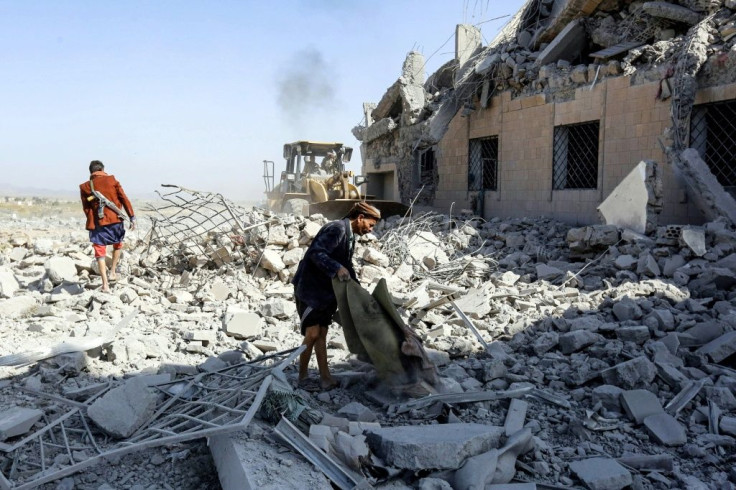UK May Resume Arms Sales To Saudi Arabia Despite Humanitarian Crises In Yemen Civil War

KEY POINTS
- Britain is one of Saudi Arabia’s biggest arms dealers
- BAE Systems has sold $18.8 billion of arms to the kingdom over the last five years
- The war in Yemen has cost about 100,000 lives.
The British government said it will resume its program of selling weapons to Saudi Arabia just one year after the Court Of Appeal ruled that such sales were illegal because government ministers had failed to properly assess the risk of civilian casualties in Yemen where the Saudis are engaged in a bloody civil war.
However, on Tuesday, the U.K. Secretary of State for International Trade Liz Truss said weapon sales to Saudi Arabia can resume after an official review determined that airstrikes that killed civilians in Yemen were only “isolated incidents.”
“The [British] government will now begin the process of clearing the backlog of license applications for Saudi Arabia and its coalition partners that has built up since [June 20] last year,” Truss said. “I have assessed that there is not a clear risk that the export of arms and military equipment to Saudi Arabia might be used in the commission of a serious violation of IHL [International Humanitarian Law]… The incidents which have been assessed to be possible violations of IHL occurred at different times, in different circumstances and for different reasons.”
A U.K. government spokesperson added: “The government takes its export responsibilities seriously and assesses all export licenses in accordance with strict licensing criteria. We will not issue any export licenses where to do so would be inconsistent with these criteria.”
Britain is one of Saudi Arabia’s biggest arms dealers. Defense contractor BAE Systems has sold £15 billion ($18.8 billion) of arms to the kingdom over the last five years, mostly by supplying and Tornado and Typhoon aircraft which are used in bombing missions.
Thousands of civilians have been killed in the Yemen civil war since it erupted in March 2015. Bombing by a Saudi-led coalition has been accused of 12,600 deaths in air attacks. In just one incident in February of this year, 26 children were killed and 18 injured when airstrikes struck a civilian gathering in the Al Maslub district of Yemen. On the whole, the war has cost about 100,000 lives.
The United Nations International Children’s Fund called the war a “crisis is of cataclysmic proportions.”
Activists opposed to the arms trade were outraged, calling the measure “disgraceful and morally bankrupt.”
“The Saudi-led bombardment of Yemen has created the world’s worst humanitarian crisis, and the [British] government itself admits that U.K.-made arms have played a central role [in] the bombing,” said Andrew Smith of Campaign Against Arms Trade. “We will be considering this new decision with our lawyers and will be exploring all options available to challenge it.”
Smith added: "The evidence shows a clear pattern of heinous and appalling breaches of International humanitarian law by a coalition which has repeatedly targeted civilian gatherings such as weddings, funerals, and marketplaces. The [U.K.] government claims that these are isolated incidents, but how many hundreds of isolated incidents would it take for the government to stop supplying the weaponry? This exposes the rank hypocrisy at the heart of U.K. foreign policy. Only yesterday the government was talking about the need to sanction human rights abusers, but now it has shown that it will do everything it can to continue arming and supporting one of the most brutal dictatorships in the world."
Ironically, the resumption of arms sales to Riyadh came one day after the British Foreign Office sanctioned 20 Saudi nationals who were alleged to be involved with the murder of journalist Jamal Khashoggi.
Emily Thornberry, the shadow trade secretary and a member of the opposition Labour Party said the British government was delivering mixed messages.
“Britain should be working flat out to bring this terrible war to an end, not selling the arms that continue to fuel it,” she said.
Liberal Democrat MP Layla Moran called the decision "jaw-dropping" and accused ministers of "putting profit before lives.”
“It’s time the government stood firm for the values we believe in like human rights and international law, instead of allowing them to be sold off to the highest bidder," she added.
Kate Allen, Amnesty International U.K.’s Director, said: “This is a deeply cynical move to restart business as usual when it comes to Saudi arms sales. How the government can seriously describe a five-year Saudi-led aerial assault on Yemen which has seen numerous examples of civilians killed in schools, hospitals, funeral halls and market places as a set of ‘isolated incidents’ is almost beyond comprehension. This seems like an attempt to rewrite history and disregard international law. The U.K. is bypassing its obligations under the international arms control framework. Its approach to this decision has effectively rendered our own protections meaningless."
© Copyright IBTimes 2025. All rights reserved.





















